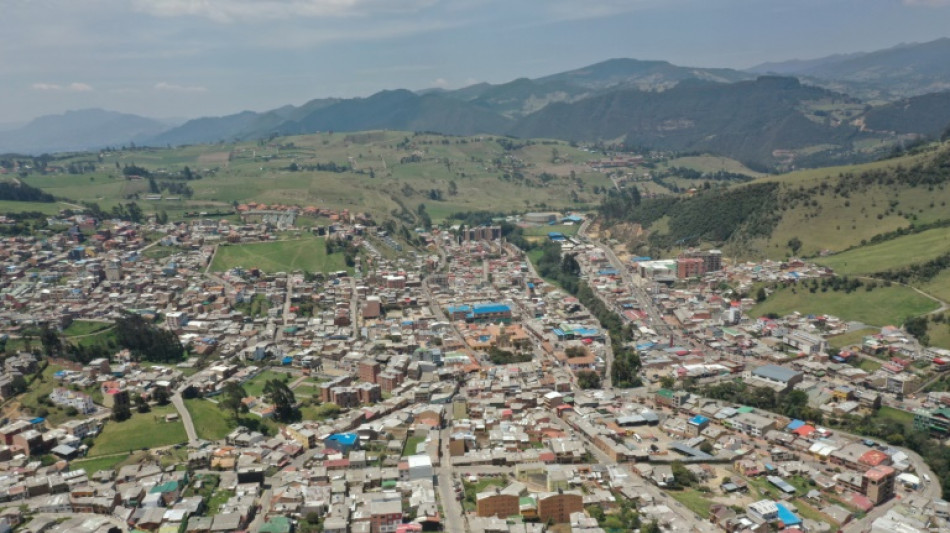
-
 EU warns Meta it must open up WhatsApp to rival AI chatbots
EU warns Meta it must open up WhatsApp to rival AI chatbots
-
Scotland spoil Italy's T20 World Cup debut with big win

-
 Israeli president says 'we will overcome evil' at Bondi Beach
Israeli president says 'we will overcome evil' at Bondi Beach
-
Munsey leads Scotland to 207-4 against Italy at T20 World Cup

-
 Japan restarts world's biggest nuclear plant again
Japan restarts world's biggest nuclear plant again
-
Bangladesh poll rivals rally on final day of campaign

-
 Third impeachment case filed against Philippine VP Duterte
Third impeachment case filed against Philippine VP Duterte
-
Wallaby winger Nawaqanitawase heads to Japan

-
 Thailand's Anutin rides wave of nationalism to election victory
Thailand's Anutin rides wave of nationalism to election victory
-
Venezuela's Machado says ally kidnapped by armed men after his release

-
 Maye longs for do-over as record Super Bowl bid ends in misery
Maye longs for do-over as record Super Bowl bid ends in misery
-
Seahawks' Walker rushes to Super Bowl MVP honors

-
 Darnold basks in 'special journey' to Super Bowl glory
Darnold basks in 'special journey' to Super Bowl glory
-
Japan's Takaichi may struggle to soothe voters and markets

-
 Seahawks soar to Super Bowl win over Patriots
Seahawks soar to Super Bowl win over Patriots
-
'Want to go home': Indonesian crew abandoned off Africa demand wages

-
 Asian stocks track Wall St rally as Tokyo hits record on Takaichi win
Asian stocks track Wall St rally as Tokyo hits record on Takaichi win
-
Bad Bunny celebrates Puerto Rico in joyous Super Bowl halftime show

-
 Three prominent opposition figures released in Venezuela
Three prominent opposition figures released in Venezuela
-
Israeli president says 'we shall overcome this evil' at Bondi Beach

-
 'Flood' of disinformation ahead of Bangladesh election
'Flood' of disinformation ahead of Bangladesh election
-
Arguments to begin in key US social media addiction trial

-
 Dr. Jonathan Spages Expands Diabetes Reversal Practice Across New States, Adds Clinical Team to Meet Growing Demand
Dr. Jonathan Spages Expands Diabetes Reversal Practice Across New States, Adds Clinical Team to Meet Growing Demand
-
Agronomics Limited Announces Net Asset Value Calculation as at 31 December 2025

-
 UK-Based Vesalic Limited Emerges from Stealth with Landmark Discovery of Potential Non-CNS Driver of Motor Neuron Diseases, including ALS, and Breakthrough Therapeutic and Diagnostic Opportunities
UK-Based Vesalic Limited Emerges from Stealth with Landmark Discovery of Potential Non-CNS Driver of Motor Neuron Diseases, including ALS, and Breakthrough Therapeutic and Diagnostic Opportunities
-
Gotterup tops Matsuyama in playoff to win Phoenix Open

-
 New Zealand's Christchurch mosque killer appeals conviction
New Zealand's Christchurch mosque killer appeals conviction
-
Leonard's 41 leads Clippers over T-Wolves, Knicks cruise

-
 Trump says China's Xi to visit US 'toward the end of the year'
Trump says China's Xi to visit US 'toward the end of the year'
-
Real Madrid edge Valencia to stay on Barca's tail, Atletico slump

-
 Malinin keeps USA golden in Olympic figure skating team event
Malinin keeps USA golden in Olympic figure skating team event
-
Lebanon building collapse toll rises to 9: civil defence

-
 Real Madrid keep pressure on Barca with tight win at Valencia
Real Madrid keep pressure on Barca with tight win at Valencia
-
PSG trounce Marseille to move back top of Ligue 1

-
 Hong Kong to sentence media mogul Jimmy Lai in national security trial
Hong Kong to sentence media mogul Jimmy Lai in national security trial
-
Lillard will try to match record with third NBA 3-Point title

-
 Vonn breaks leg as crashes out in brutal end to Olympic dream
Vonn breaks leg as crashes out in brutal end to Olympic dream
-
Malinin enters the fray as Japan lead USA in Olympics team skating

-
 Thailand's Anutin readies for coalition talks after election win
Thailand's Anutin readies for coalition talks after election win
-
Fans arrive for Patriots-Seahawks Super Bowl as politics swirl

-
 'Send Help' repeats as N.America box office champ
'Send Help' repeats as N.America box office champ
-
Japan close gap on USA in Winter Olympics team skating event

-
 Liverpool improvement not reflected in results, says Slot
Liverpool improvement not reflected in results, says Slot
-
Japan PM Takaichi basks in election triumph

-
 Machado's close ally released in Venezuela
Machado's close ally released in Venezuela
-
Dimarco helps Inter to eight-point lead in Serie A

-
 Man City 'needed' to beat Liverpool to keep title race alive: Silva
Man City 'needed' to beat Liverpool to keep title race alive: Silva
-
Czech snowboarder Maderova lands shock Olympic parallel giant slalom win

-
 Man City fight back to end Anfield hoodoo and reel in Arsenal
Man City fight back to end Anfield hoodoo and reel in Arsenal
-
Diaz treble helps Bayern crush Hoffenheim and go six clear


Fewer showers, less laundry, as water cuts hit Bogota
Residents of Bogota are facing fewer showers, minimal laundry loads and dirty cars as the Colombian capital imposes water rations due to a severe drought aggravated by the El Nino climate phenomenon.
Bogota has become the latest major city around the world to face a water crisis in recent years due to intense dry spells and President Gustavo Petro vowed Thursday to boost investment to protect the valuable resource.
Some 10 million people in the Colombian capital and surrounds are being impacted by new restrictions that impose 24-hour water cuts every ten days by sector.
"The situation is critical," said Mayor Carlos Fernando Galan.
In the mountainous suburb La Calera in the sprawling Andean city, residents have already suffered occasional cuts since February, often resorting to tanker trucks that wind through the steep streets to deliver drinking water.
"There are things we can no longer do, like washing the car," said Clara Escobar, 36, a graphic designer who came to fill two buckets from the tanker.
"We shower less" and "we wash the clothes (only) when necessary."
- Dams lowest in decades -
Lorena Lee, 46, who owns a cafeteria in La Calera, predicts she will not open on the days the suburb is affected by cuts as she cannot prepare food without water.
"Obviously this affects a day of sales ... but there is nothing to do."
A lack of rain and unusual heat has seen Colombia's reservoirs dry up at an alarming rate.
The Chingaza paramo -- an alpine wetland system rich in glacial lakes -- provides some 70 percent of Bogota's drinking water, and its dams are at their lowest level since 1980.
Environment Minister Susana Muhamad said significant rains were only expected at the end of April or early May.
Colombia is blessed with abundant freshwater sources.
Nevertheless, millions lack access to clean water as a result of severe water pollution, deforestation, and agriculture.
- 'Substantial change' -
In a lengthy post on X, President Gustavo Petro said he had ordered "a substantial change" to ensure that in the next 30 years, the entire population has clean water.
"There will be droughts worse than the one we are facing," he said, adding that Bogota residents could now judge whether "unhindered urbanization" was sustainable.
He said half of the country's water supply depends on its moors, jungles and Andean forests "that have already been pillaged by 80 percent for agriculture or mining for construction."
Petro said the country had long prioritized urbanization at the expense of the "serious financing of adaptation to climate change."
He said at current investment levels it would take a century to provide clean drinking water and proper sanitation to the 17 million people who currently do not have it.
Petro added that providing these people with drinking water would cost $26 billion.
"That is absurdly irrational in the midst of a climate crisis that will worsen due to the growing consumption of coal and oil in rich northern societies."
Major cities around the globe are considered at risk of running out of water due to human activities and climate change-linked droughts.
Mexico saw 21 percent less rainfall than usual in 2023 -- its driest year since records began -- and reservoirs serving the capital of 20 million people have plummeted, sparking supply cuts and jitters among residents.
In 2023, residents of Uruguay's capital of Montevideo turned en masse to bottled water as reservoirs dropped so low that authorities had to mix brackish river water into the drinking supply and up the allowed sodium and chloride levels.
And, residents of the South African city of Cape Town narrowly escaped so-called "Day Zero" when taps would have run dry in 2018 due to a multi-year drought.
S.F.Warren--AMWN


